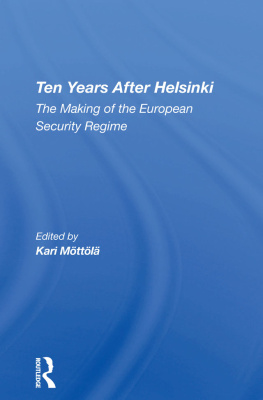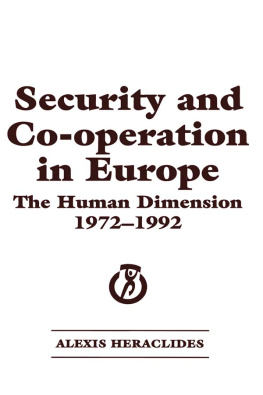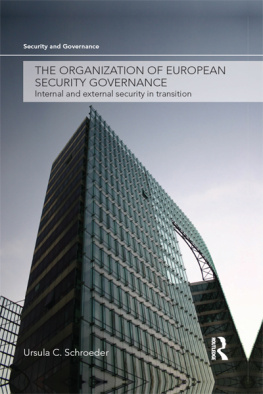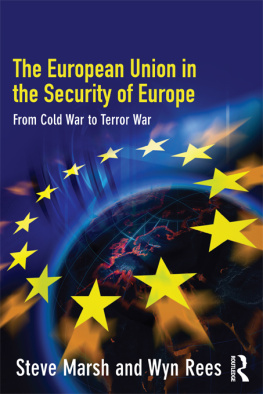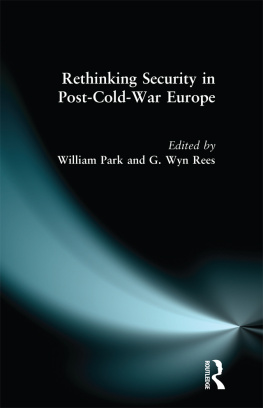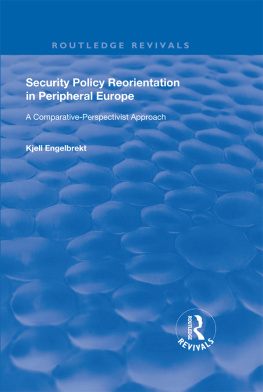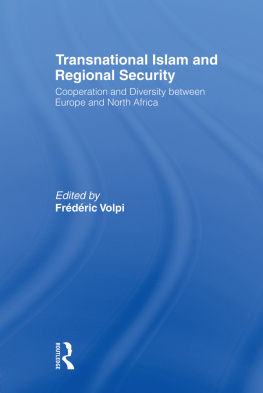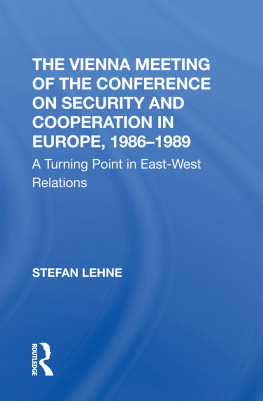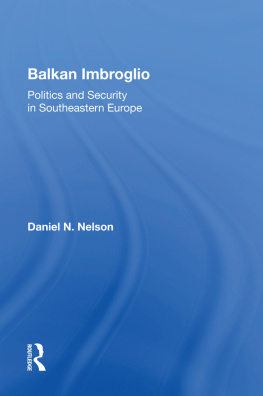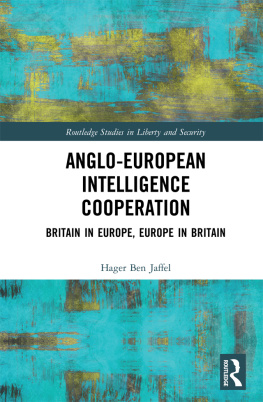Ten Years After Helsinki
About the Book and Editor
Divided between two military alliances, Europe has maintained stability based on political status quo and military power balance. However, European statesincluding neutral and nonaligned countrieshave felt a need for a common policy to guarantee their security, and the Conference on Security and Cooperation in Europe (CSCE) was convened to address this concern. Ten years later, the authors of this study find that the outlines of a European security regime are indeed discernible.
The conference in Helsinki initiated efforts for negotiated and controlled change in Europe. Contributors to this volume analyze the achievements of CSCE, consider more recent models of collective or common security systems, and deal with political and military processes at work in Europe as well as relationships with great powers and the Third World. The role of Western Europe, and particularly Finland's role as an initiator of the CSCE process, receives special attention. Documentation of the tenth anniversary meeting and the CSCE process in general are also included.
Kari Mttl is director of the Finnish Institute of International Affairs, editor of Nuclear Weapons and Northern Europe and Yearbook of Finnish Foreign Policy, and co-editor of Finnish-Soviet Economic Relations.
Published in Cooperation with the Finnish Institute of International Affairs
Ten Years After Helsinki
The Making of the European Security Regime
edited by Kari Mttl
First published 1986 by Westview Press, Inc.
Published 2019 by Routledge
52 Vanderbilt Avenue, New York, NY 10017
2 Park Square, Milton Park, Abingdon, Oxon OX14 4RN
Routledge is an imprint of the Taylor & Francis Group, an informa business
Copyright 1986 Taylor & Francis
All rights reserved. No part of this book may be reprinted or reproduced or utilised in any form or by any electronic, mechanical, or other means, now known or hereafter invented, including photocopying and recording, or in any information storage or retrieval system, without permission in writing from the publishers.
Notice:
Product or corporate names may be trademarks or registered trademarks, and are used only for identification and explanation without intent to infringe.
Library of Congress Cataloging-in-Publication Data
Ten years after Helsinki.
Includes index.
1. Conference on Security and Cooperation in EuropeAddresses, essays, lectures. 2. EuropeDefensesAddresses, essays, lectures. 3. European cooperationAddresses, essays, lectures. 4. EuropeForeign relations1945- Addresses, essays, lectures. I. Mttl, Kari.
D1053.T46 1986 327.1'7'094 86-1646
ISBN 13: 978-0-367-28985-0 (hbk)
Contents
, Kari Mttl
, Juha Halma
, Adam Daniel Rotfeld
, Pierangelo Isernia
, Esko Antola
Hans-Henrik Holm
, Lars B. Wallin
, Leo Mates
, Philippe Moreau Defarges
, Rudolf Th. Jurrjens
, Klaus Krokfors
Kari Mttl
The European political scene is a mix of stability and change. The existing security system has prevailed largely unchanged since the aftermath of the Second World War. It is a negotiated order, based on the recognition of political status quo and depending heavily on the balance of military power between East and West. In many ways, it is a traditional security order. Force is the accepted ultimate guarantee of security even though only as a threat, not as a usable instrument of policy.
At the same time, however, there are factors of change in the European system. These trends point to an idea of Europe as a whole, overcoming some of its divisions. There are common norms and joint institutions that are all-European. They give coherence and purpose to the relations between European states in a way that transcend the classic anarchic order. There is a security regime emerging in Europe of converging expectations regarding the behaviour of European states vis--vis each other and regarding their common goals as European states.
The main embodiment of the common European idea is the Conference on Security and Cooperation in Europe (CSCE). Certainly, the CSCE is very much a forum for alliance politics but its working practices as well as its political life so far witness a much more complicated European polity. In many ways, the CSCE process activates those impulses for cooperation that grow out of material welfare and human needs, and those aspirations for security that are common for the Europe that has lived through two world wars and still carries memories and signs of those catastrophes.
At the same time, the CSCE is a forum where the participating states look after their vital national security interests with the utmost care. The CSCE has not changed security arrangements but it has touched upon issues where all the states have to demonstrate and crystallize their basic course. So, the CSCE is both an innovating and reinforcing exercise.
The CSCE process has proved to be durable but its concrete effects on the European scene are difficult to determine. Has Europe changed because of the the CSCE and how? Does the CSCE process make Europe something more than its parts? Can the idea of a Europe as one change the existing security structures or security thinking among the European states?
These are some of the points of departure for this book which has grown out of the international round table seminar "Ten years after Helsinki: European security a new beginning?" that was arranged by the Finnish Institute of International Affairs (FIIA) in Haikko Manor, outside Helsinki, in June 1985. The immediate cause for the seminar where participants from 20 CSCE countries were present was the tenth anniversary meeting of the Final Act held in Helsinki, 30 July 1 August. But the focus was, from the beginning, on the European security system as a whole, albeit with special emphasis on the CSCE process.
The essay on theoretical aspects of the research on dtente and the CSCE by Juha Holma was prepared as a background study for the seminar whereas Klaus Krokfors' account of Finland's activities in the CSCE was originally written for the special issue on the CSCE process of Ulkopolitiikka (2/1985), the quarterly journal of the FIIA.
The other articles are papers presented at the Haikko seminar. Pierangelo Isernia and Esko Antola look at some general features of the European security system, the former on the interaction between external and internal factors in security policy and the latter on various models for security orders, historically and theoretically. Adam Daniel Rotfeld, Leo Mates, Philippe Moreau Defarges and Rudolf Th. Jurrjens assess the CSCE experience itself. Hans-Henrik Holm and Lars B. Wallin take up some of the key military issues for the future construction of European security.
The European security regime is outlined in the book from several angles, concentrating on different issue-areas and using varying approaches. No synthesis is attempted but even these articles demonstrate that a lot more is happening in the European political scene than is normally recognized. The CSCE process may not yet have chosen its course and emphasis. The third follow-up meeting in Vienna, starting in autumn 1986, will be the next opportunity for choosing the line and pulling the strings together. This book tries to show that there are materials and elements in the European scene for an emerging security regime but a lot of heavy and demanding political decisions will have to be made before any deep-going changes take place.

